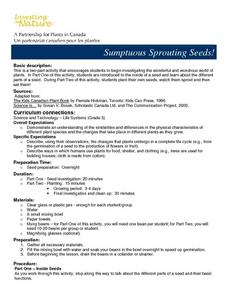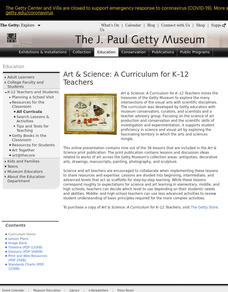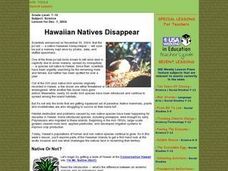Curated OER
Life cycles
Students identify and explain the parts of a flower and their role in the life cycle of flowering plants, including pollination, seed dispersal, and germination. Students recap the following information: that plants need light, warmth,...
Curated OER
Find the Summer Flowers
In this summer flowers worksheet, students analyze 6 names of flowers that bloom in summer. Students find these in a word search.
Curated OER
How Do Flowering Plants Reproduce?
Sixth graders learn the parts and function of flowering plants.
Curated OER
Medieval and Renaissance Art: Botanical Symbolism
Students study the significance of flowers in art from two periods. In this Medieval and Renaissance art lesson plan, students research the presence and meaning of botanical illustrations in twelfth, thirtieth, and fourteenth century...
Curated OER
Which Sex is It?
Students investigate the structures of flowers. In this determining the sex organs of a flower lesson plan, students dissect flowers with both male and female sex organs and identify each. They also identify the other parts of the flower...
Curated OER
Build a 3-d Plant Model
Third graders construct a three-dimensional model of a flowering plant. They examine the major plant parts and their basic functions. They demonstrate an understanding of the similarities and differences in the physical...
Curated OER
Sumptuous Sprouting Seeds!
Third graders investigate the wonderful and wondrous world of plants. They examine the inside of a seed, explore the different parts of a seed, plant their own seeds, watch them sprout and then eat them! They describe, using their...
Curated OER
4-H Horticulture and Gardening- Intermediate Learner's Page
In this 4-H horticulture and gardening worksheet, students study how some of the food they eat is the stems, roots, leaves, seeds, and flowers of plants by completing a fill-in-the-blank activity and a word search page. They examine the...
Curated OER
Clearly Classified
Young scholars review the classification system for living organisms and apply it the classification of insects and flowers in the still life by Ambrosius Bosschaert. They create a chart classifying the animals and plants in the painting...
Curated OER
Insects Are Helpful!
Students see that insects do lots good and are very valuable to humans and nature. This is part of an ongoing effort to dispel fears of insects. They rotate through a series of centers that have examples of how insects contribute to our...
Curated OER
Plants and Animals, Partners in Pollination
Students participate in multiple hands-on activities to explore reproduction and pollination. In groups, using a cotton swab and powder, students simulate being pollinators and plants. They name the parts of the flowers and the function...
Institute of Electrical and Electronics Engineers
Shipping For Survival
Students explore package engineering and investigate design. In this shipping instructional activity students are given a flower and are to come up with a packaging that will allow the flower to get to its destination as fresh as...
Curated OER
How Plants Spice Up Our Lives
Third graders study plants. In this biology lesson plan, 3rd graders label and identify parts of plants, identify spices obtained from plants, and determine what part of a plant a spice comes from by using taste, touch, smell and sight.
Curated OER
Food, Food, And More Food From Plants!
Students examine the edible parts of a plant and explore their function. They define what makes a fruit classified as a fruit. They create a sketch or map or photo of a 1930s farm and justify their plant selections.
Curated OER
Dress Up a Twig
Students study the structure and function of the parts of a winter twig. They determine how to identify trees using the twigs.
Curated OER
A Wild Chain Reaction
Students explore habitats. In this habitat lesson, students break into groups and are labeled as a part of a habitat. Students then do an activity with yarn that shows how all of the parts are connected and depend on each...
Curated OER
Gifts from the Sea
Students investigate parts of the ocean. In this seaweed lesson, students identify foods that contain seaweed, parts of seaweed, and how the ocean affects our lives. As a class students brainstorm ways we rely on the ocean and compare...
Curated OER
Too Bee Or Not To Bee
Students recognize that bees are important in the reproduction of plants and to the survival of animals. In this bee lesson, students become familiar with the parts of bees and how those adaptations help them pollinate plants....
Curated OER
Creeping and Crawling Observing Mealworms and Earthworms
Students observe the inherited traits in earthworms and mealworms. In this organisms lesson, students view a live mealworm and earthworm on a tray and identify the body parts. Students measure the worms and observe the behavior....
Curated OER
Hawaiian Natives Disappear
Students explore parts of the Hawaiian Islands to get a examine the exotic invasion, and see what challenges the natives face in reclaiming their territory. They identify the changes in the environment that have been the hardest on the...
Curated OER
Seed Sensation
Students explore seeds through dissecting, sorting, comparing and contrasting. They draw their observations of both a closed and open seed and then they label the parts of a seed. They brainstorm where seeds come from. They compare seeds...
Curated OER
Review of the Five Senses
Students investigate the five senses. In this human biology lesson, students are given five items and identify which items match best with each of the senses. Students use objects such as a rock, hard candy, and a flower.
Curated OER
Saved by a Shark
Middle schoolers explore the marine ecosystem and the importance of sharks. In this shark lesson, students look at photos of the Flower Garden Banks National Marine Sanctuary and discuss the animals that live there. They discuss which...
Curated OER
The Dirt on Plants
Students draw and label the four parts of a plant. They describe changes that are part of the common life cycle. Students follow various one and two step directions. They are asked to discuss that they can recall about plants.

























